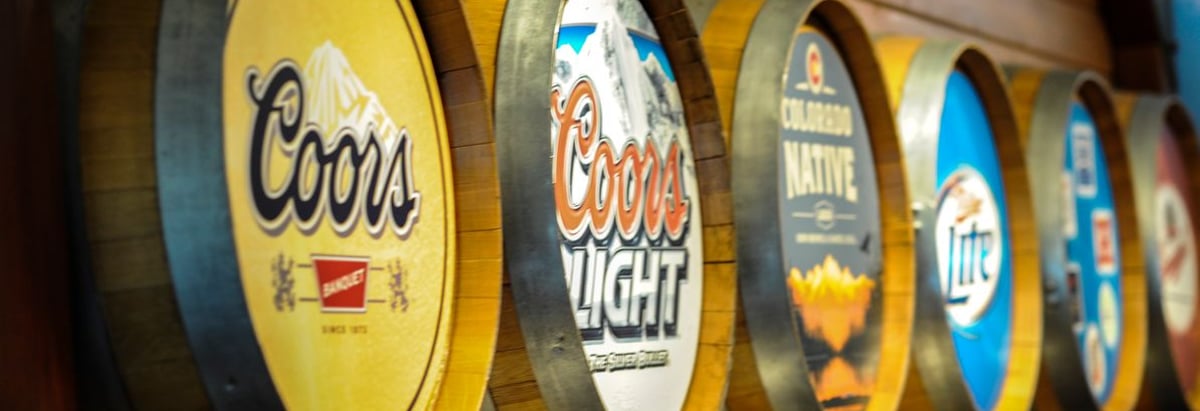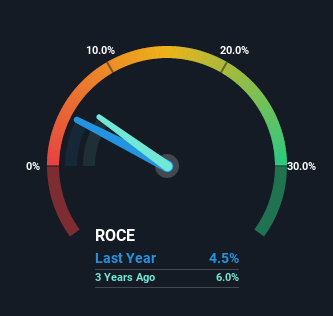- United States
- /
- Beverage
- /
- NYSE:TAP
Molson Coors Beverage's (NYSE:TAP) Returns On Capital Not Reflecting Well On The Business

When it comes to investing, there are some useful financial metrics that can warn us when a business is potentially in trouble. Typically, we'll see the trend of both return on capital employed (ROCE) declining and this usually coincides with a decreasing amount of capital employed. This reveals that the company isn't compounding shareholder wealth because returns are falling and its net asset base is shrinking. In light of that, from a first glance at Molson Coors Beverage (NYSE:TAP), we've spotted some signs that it could be struggling, so let's investigate.
What Is Return On Capital Employed (ROCE)?
Just to clarify if you're unsure, ROCE is a metric for evaluating how much pre-tax income (in percentage terms) a company earns on the capital invested in its business. To calculate this metric for Molson Coors Beverage, this is the formula:
Return on Capital Employed = Earnings Before Interest and Tax (EBIT) ÷ (Total Assets - Current Liabilities)
0.045 = US$1.0b ÷ (US$26b - US$3.4b) (Based on the trailing twelve months to December 2022).
So, Molson Coors Beverage has an ROCE of 4.5%. Ultimately, that's a low return and it under-performs the Beverage industry average of 14%.
View our latest analysis for Molson Coors Beverage

Above you can see how the current ROCE for Molson Coors Beverage compares to its prior returns on capital, but there's only so much you can tell from the past. If you'd like, you can check out the forecasts from the analysts covering Molson Coors Beverage here for free.
SWOT Analysis for Molson Coors Beverage
- Debt is well covered by earnings and cashflows.
- Dividend is low compared to the top 25% of dividend payers in the Beverage market.
- Expected to breakeven next year.
- Has sufficient cash runway for more than 3 years based on current free cash flows.
- Good value based on P/S ratio and estimated fair value.
- Paying a dividend but company is unprofitable.
What The Trend Of ROCE Can Tell Us
There is reason to be cautious about Molson Coors Beverage, given the returns are trending downwards. About five years ago, returns on capital were 6.8%, however they're now substantially lower than that as we saw above. On top of that, it's worth noting that the amount of capital employed within the business has remained relatively steady. Since returns are falling and the business has the same amount of assets employed, this can suggest it's a mature business that hasn't had much growth in the last five years. If these trends continue, we wouldn't expect Molson Coors Beverage to turn into a multi-bagger.
The Key Takeaway
In summary, it's unfortunate that Molson Coors Beverage is generating lower returns from the same amount of capital. And, the stock has remained flat over the last five years, so investors don't seem too impressed either. With underlying trends that aren't great in these areas, we'd consider looking elsewhere.
One more thing, we've spotted 2 warning signs facing Molson Coors Beverage that you might find interesting.
While Molson Coors Beverage isn't earning the highest return, check out this free list of companies that are earning high returns on equity with solid balance sheets.
New: Manage All Your Stock Portfolios in One Place
We've created the ultimate portfolio companion for stock investors, and it's free.
• Connect an unlimited number of Portfolios and see your total in one currency
• Be alerted to new Warning Signs or Risks via email or mobile
• Track the Fair Value of your stocks
Have feedback on this article? Concerned about the content? Get in touch with us directly. Alternatively, email editorial-team (at) simplywallst.com.
This article by Simply Wall St is general in nature. We provide commentary based on historical data and analyst forecasts only using an unbiased methodology and our articles are not intended to be financial advice. It does not constitute a recommendation to buy or sell any stock, and does not take account of your objectives, or your financial situation. We aim to bring you long-term focused analysis driven by fundamental data. Note that our analysis may not factor in the latest price-sensitive company announcements or qualitative material. Simply Wall St has no position in any stocks mentioned.
About NYSE:TAP
Molson Coors Beverage
Manufactures, markets, and sells beer and other malt beverage products in the Americas, Europe, the Middle East, Africa, and the Asia Pacific.
Undervalued with proven track record and pays a dividend.


